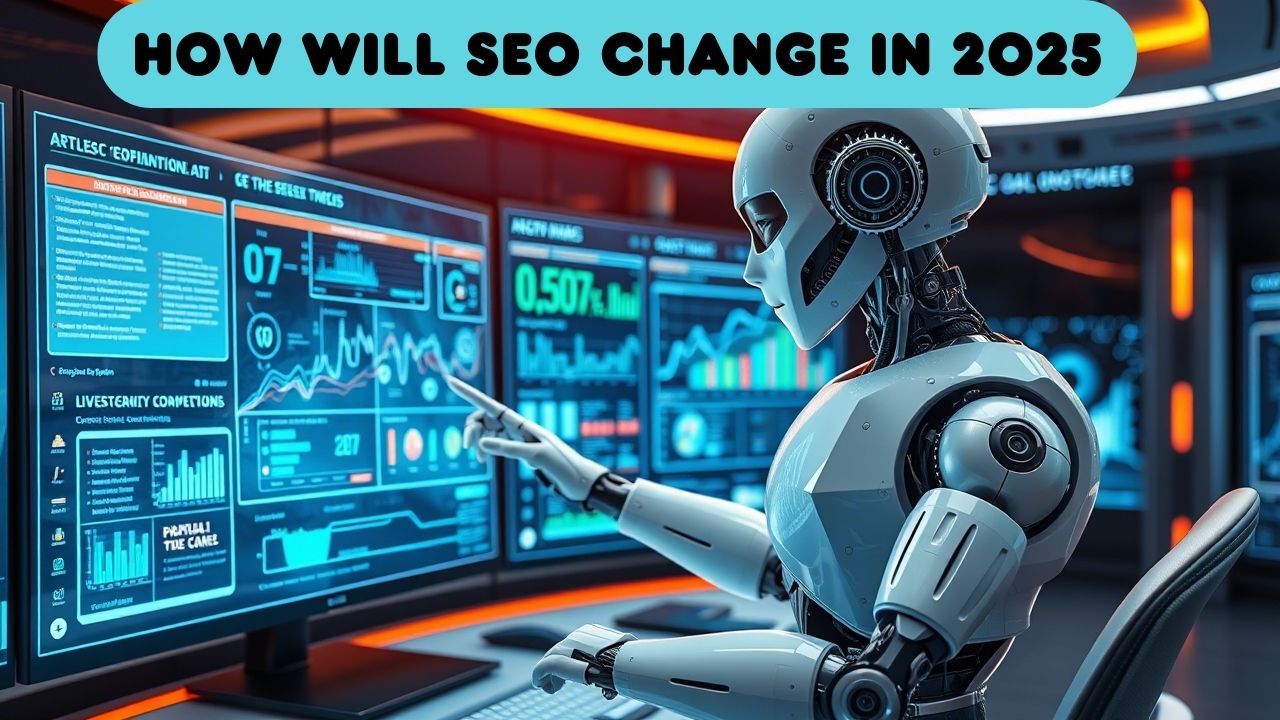Predictions for SEO Trends in 2025
How Will SEO change in 2025? The landscape of search engine optimization is ever-changing, influenced by advancements in technology and shifting consumer behavior. As we look toward 2025, several key trends are likely to reshape how you approach SEO. Understanding these trends will help you stay ahead of the competition and ensure your website continues to attract organic traffic.
Increased Focus on User Experience
User experience (UX) is a crucial factor in SEO, and its importance is only set to grow. By 2025, search engines will prioritize websites that deliver exceptional user experiences. This includes fast loading times, mobile responsiveness, and intuitive navigation. To prepare for this shift, consider the following:
- Optimize your website for speed; aim for loading times under three seconds.
- Ensure your website is fully responsive, catering to users on smartphones and tablets.
- Make navigation straightforward to help users find what they need quickly.

Voice Search Optimization
With the rising popularity of voice-activated devices, voice search is rapidly changing how users interact with search engines. By 2025, it’s predicted that over 50% of searches will be voice-based. This trend will require a shift in your keyword strategy:
- Focus on natural language processing; users speak differently than they type.
- Incorporate long-tail keywords and phrases that mimic spoken language.
- Focus on local SEO to capture voice searches conducted on-the-go.
Artificial Intelligence and Machine Learning
How Will SEO change in 2025? The rise of artificial intelligence (AI) and machine learning is set to revolutionize SEO practices. Search engines will become better at understanding context, sentiment, and user intent. Here’s how to align your strategy:
- Create high-quality, relevant content that addresses users’ questions and needs.
- Utilize AI-driven tools for analytics and keyword research to stay competitive.
- Regularly update your content to maintain freshness, a key factor for AI algorithms.
Visual and Video Content Dominance
As attention spans shorten, visual content such as images and videos are becoming essential for engaging your audience. Following trends into 2025, you should focus on:
- more video content, as videos are expected to account for over 80% of all web traffic.
- Using infographics and visual aids to make content more digestible.
- Optimizing images and videos for SEO, including proper tags and descriptions.
Semantic Search and Intent-Based SEO
Search engines are evolving to deliver results based on the intent behind searches, not just specific keywords. This means that understanding user intent is vital for your SEO strategy. To stay ahead, you should:
- Conduct thorough keyword research focusing on user intent categories: informational, navigational, transactional, and local.
- Create content that specifically addresses these intents while integrating relevant keywords.
- Structure your content in a way that answers questions and provides comprehensive solutions.
Privacy and Data Protection
With increasing scrutiny on data privacy and protection, SEO practices will have to adapt. By 2025, transparency will be crucial. Keep these points in mind:
- Be transparent about how you handle user data; use privacy policies clearly stated on your site.
- Utilize “cookie consent” mechanisms and comply with GDPR regulations.
- Improve your site’s security to protect user information; HTTPS is now a must.
The Role of EAT (Expertise, Authoritativeness, Trustworthiness)
How Will SEO change in 2025? Search engines are placing more emphasis on the EAT principle in determining rankings. By 2025, this will only get more intense. To enhance your EAT, consider the following:
- Showcase your expertise with author bios and credentials related to your niche.
- Acquire backlinks from reputable sites to enhance your authority.
- Encourage user-generated content and reviews to build trust with your audience.
As you prepare for the changes coming in 2025, embrace these trends to enhance your SEO strategy. Prioritizing user experience, adapting to new technologies, and staying informed about evolving practices will position your website for success in the ever-competitive digital landscape.
The Rise of Voice Search and Its Impact on SEO
The evolving landscape of search engine optimization (SEO) demands that businesses stay ahead of the curve to maintain visibility and engagement. One of the most significant shifts we’ve seen is the rise of voice search. As technology advances, more people are using voice-activated devices for their search queries. This trend will continue to shape SEO not only in 2025 but far beyond.
How Will SEO change in 2025? Voice search has gained traction due to its convenience. With the ability to ask your device questions and receive immediate answers, users are opting for this method over traditional text-based searches. It changes how people interact with search engines, and in turn, how businesses must optimize their content.
Here are some key factors to consider regarding the rise of voice search:
- Natural Language Processing: Voice searches typically involve a more conversational tone. Users will speak in full sentences rather than phrases. This shift requires businesses to adapt their SEO strategies to focus on long-tail keywords and phrases that reflect natural speech.
- Focus on Local SEO: Many voice searches have local intent, such as looking for nearby restaurants or services. Businesses should optimize their local SEO by ensuring that their Google My Business profiles are updated and that they use location-based keywords.
- Immediate Answers: Voice search results often prioritize quick and concise answers. This makes featured snippets more valuable. Websites should aim to provide straightforward information that can be returned as a voice search result.
- Mobile Optimization: With most voice searches conducted on mobile devices, it’s crucial to ensure your website is mobile-friendly. Load times and responsiveness affect how well your site will perform in voice search queries.
To optimize for voice search effectively, businesses should rethink their content strategies. Here are some actionable steps:
- Target Conversational Keywords: Use tools like Google Keyword Planner and Answer the Public to find questions people are asking related to your business or industry. For example, if you run a coffee shop, keywords such as “Where can I find the best coffee near me?” become important.
- Create FAQs: Frequently asked questions are ideal for voice searches. Providing clear, concise answers can enhance your chances of appearing in voice search results. Formatting these FAQs in a simple Q&A format can also improve user experience.
- Optimize for Local Search: Ensure your address, phone number, and business hours are easily accessible on your website. Engaging with local directories can also boost your visibility in local voice searches.
- Use Schema Markup: Schema markup helps search engines understand your content. It can enhance the chances of your website being featured in rich results, which are often read aloud by voice assistants.
The impact of voice search on SEO is significant, but it can also lead to new opportunities. Here are a few trends to watch for as we approach 2025:
- Increased Use of AI and Machine Learning: As AI technology improves, voice recognition systems will become smarter. This will affect the way voice queries are interpreted, making natural language processing even more crucial.
- Growing Popularity of Smart Speakers: Devices like Amazon Echo and Google Home are becoming more common in households. As more users rely on these devices for daily tasks, optimizing for voice search becomes essential.
- Shift in Consumer Behavior: As younger generations grow up with voice technology, their searching habits will reflect their upbringing. Understanding these behavioral changes will be crucial for businesses in adapting their strategies.
As we look towards 2025, embracing voice search optimization should be a priority for businesses seeking to improve their online presence. By focusing on natural language, local SEO, and creating user-friendly content, brands can stay ahead of the competition. The key is to think like your audience and understand how they are interacting with search technology. With the right strategies, you can ensure your content remains visible and engaging in this evolving digital landscape.
User Experience and Its Role in Future Search Rankings
How Will SEO change in 2025? User experience (UX) has increasingly become a pivotal factor in determining how websites rank in search results. With a shift toward prioritizing the needs and satisfaction of users, it’s crucial to understand how this trend will evolve. As we look towards the future, particularly in 2025, the integration of user experience into search algorithms is expected to deepen, impacting web strategies significantly.
Understanding User Experience in Search
User experience encompasses every aspect of a user’s interaction with a website. This includes the site’s design, accessibility, loading speed, and overall usability. In essence, an excellent UX ensures that users can find the information they seek quickly and enjoyably. This creates loyalty and repeat visits, which are vital for SEO.
Why User Experience Matters More Than Ever
As the internet becomes more crowded, the competition for attention intensifies. Here’s why user experience will be a central player in future search rankings:
- User Engagement: Websites that offer a seamless, engaging experience are likely to keep visitors on their pages longer. Higher dwell time may signal to search engines that the content is valuable.
- Mobile Optimization: With more users accessing the web via mobile devices, a mobile-friendly design is non-negotiable. Google has already prioritized mobile-first indexing, and this trend will continue.
- Voice Search: As voice-activated systems like Siri and Alexa become more prevalent, search queries are shifting. User experience will need to adapt to include conversational, natural language that aligns with these searches.
- Accessibility: Websites that are accessible to everyone, including users with disabilities, will rank higher. Adopting best practices in accessibility enhances user experience and expands audience reach.
Anticipating UX Trends in 2025
How Will SEO change in 2025? To stay ahead, businesses must anticipate the following user experience trends that will shape search engine optimization efforts:
- Personalization: Tailored experiences based on user preferences and behaviors will become the norm. AI will play a substantial role in gathering and analyzing user data, offering more customized content and recommendations.
- Content Experience: The emphasis on high-quality content will not diminish, but the experience around that content will take precedence. Expect to see interactive elements, such as quizzes or videos, enriching the content presentation.
- Faster Page Load Times: Websites must focus on speed. A delay of just a few seconds can result in user frustration and abandonment. Google will likely incorporate loading speed as more significant factor in its algorithms.
- Augmented Reality (AR) and Virtual Reality (VR): As these technologies become more accessible, integrating AR and VR into user experiences can enhance engagement and provide immersive content.
Measuring User Experience Effectively
To optimize user experience successfully, businesses must implement effective measurement tools and techniques. Here are essential metrics to focus on:
- Bounce Rate: A high bounce rate can indicate that users are not finding what they need or that the site is challenging to navigate.
- Dwell Time: Longer dwell times suggest that users find the content valuable and engaging.
- Page Load Time: Monitoring how quickly pages load is crucial. Tools like Google PageSpeed Insights can provide vital statistics.
- User Feedback: Surveys or feedback forms can provide insights into the user experience and areas for improvement.
Preparing for the Future
As we approach 2025, it is imperative for businesses to adapt their strategies to prioritize user experience. Here are some actionable steps to take:
- Conduct regular audits of your website’s user experience.
- Stay updated on the latest trends in design and functionality.
- Invest in performance optimization tools to enhance loading speeds.
- Gather and analyze user data to create more personalized experiences.
- Focus on mobile optimization to cater to the growing mobile user base.
In essence, user experience is no longer a secondary consideration in SEO; it is a fundamental pillar. As search engines evolve, those who prioritize user experience will inevitably reap the benefits in their rankings. By adopting these strategies and focusing on the user, you position your business for success in an increasingly competitive digital landscape.
The Importance of Quality Content in a Changing SEO Landscape
The landscape of search engine optimization (SEO) is evolving rapidly, and at the heart of this evolution lies the importance of quality content. As we move towards 2025, businesses and marketers must understand how superior content can impact their ranking and visibility online. The relationship between SEO and quality content is increasingly interlinked, and recognizing this can shape a company’s digital strategy significantly.
How Will SEO change in 2025? One major reason why quality content is vital is that search engines are becoming more sophisticated. They now prioritize user experience and satisfaction. When users search for information, they want relevant, informative, and engaging content. Algorithms are continually updated to better understand user intent, which makes it crucial for content creators to meet these expectations.
Quality content is distinguished by several key factors:
- Relevance: The content should directly answer the questions or needs of users.
- Depth: Providing comprehensive insights rather than superficial information enhances user engagement.
- Originality: Unique perspectives and fresh ideas attract users and foster trust.
- Clarity: Clear and easy-to-understand language helps users grasp the message without confusion.
- Visual Appeal: Integrating images, videos, and infographics can break up text and make the content more engaging.
As artificial intelligence continues to evolve, tools like Google’s BERT (Bidirectional Encoder Representations from Transformers) and MUM (Multitask Unified Model) are setting a high standard for content quality. These technologies understand language nuances, which means that content must resonate at a higher level. In 2025, content that combines scientific data, emotional storytelling, and practical advice will likely dominate the rankings.
Furthermore, voice search is gaining traction. As more people use devices like smart speakers, the style and structure of content must adapt. Optimizing for voice search typically involves using more conversational language and question-based content. For instance, rather than asking, “Best SEO practices,” consider including a phrase like, “What are the best SEO practices for my business?” This shift highlights the need for content to align with evolving consumer behavior.

With a greater focus on quality, the significance of backlinks remains. High-quality backlinks from reputable sources reinforce the content’s credibility and authority. In 2025, companies that invest in producing quality content will find it easier to earn these crucial backlinks, creating a virtuous cycle that enhances SEO performance.
How Will SEO change in 2025? Another factor affecting SEO is the rise of video content. The demand for engaging visual content continues to grow. Combining videos with written content can improve the overall quality, cater to diverse audiences, and enhance user retention. For example, tutorial videos or webinars can attract users searching for ‘how to’ solutions while boosting engagement metrics.
| Type of Content | Benefits | SEO Impact |
|---|---|---|
| Blog Posts | Informs and educates | Increases traffic and dwell time |
| Infographics | Visually represents data | Easier to share and attract backlinks |
| Videos | Enhances engagement | Improves CTR and lowers bounce rate |
In addition to creating content, the distribution and promotion strategies are equally important. Quality content needs to reach its target audience through strategic sharing across social media platforms, email marketing, and community engagement. Engaging with users on platforms they frequent can help amplify the reach and create discussions around the content, enhancing its visibility.
How Will SEO change in 2025? As the digital environment evolves, the importance of quality content in SEO will only grow. Emphasizing relevance, originality, and clarity not only leads to improved rankings but also fosters genuine connections with users. Companies that prioritize producing quality content will be better prepared to meet the challenges of the shifting SEO landscape as we approach 2025. Adaptation, creativity, and a commitment to quality will be the cornerstones of successful SEO strategies going forward.
How Artificial Intelligence Will Shape SEO Strategies in 2025
As we look ahead to 2025, the role of artificial intelligence (AI) in shaping SEO strategies becomes increasingly significant. With the rapid advancements in technology, SEO practices will likely be transformed by AI in ways that create new opportunities for businesses and content creators. Understanding how AI will influence SEO can help you prepare for the future landscape of search engine optimization.
The Rise of AI in Search Algorithms
In 2025, we can expect search engines to rely even more heavily on AI-driven algorithms. These AI models will analyze user behavior, search intent, and context to provide more relevant results. Here’s how this evolution will influence your SEO strategies:
- Enhanced User Experience: Search engines will prioritize websites that offer a seamless user experience, including fast load times, mobile responsiveness, and easy navigation.
- Personalized Search Results: AI will enable search engines to deliver personalized results based on individual preferences, location, and past behavior.
- Improved Query Understanding: With AI, search engines will better understand complex queries, even those in natural language, allowing for more accurate results.
Content Creation and Optimization
Content will remain king, but the way it is created and optimized will be influenced by AI. In 2025, we can anticipate several key changes:
- AI-Powered Content Generation: Tools powered by AI will assist writers in generating high-quality content at scale. This means more efficient content production and tailored messaging to specific audiences.
- Voice Search Optimization: As voice-activated devices gain popularity, optimizing for voice search will become vital. This requires a focus on conversational keywords and natural language.
- Dynamic Content Recommendations: AI can analyze user interactions to suggest content topics that resonate well, allowing marketers to create targeted materials.
Link Building in an AI-Driven World
Link building will also evolve with the help of artificial intelligence. The focus will shift from quantity to quality when establishing backlinks:
- AI for Identifying Target Links: AI tools can evaluate the authority and relevance of potential backlink sources, streamlining the outreach process.
- Analyzing Competitor Strategies: Advanced AI tools can help you study competitor link profiles, revealing opportunities for your own link-building efforts.
- Natural Link Growth Tracking: AI can monitor organic link growth, providing insights into the effectiveness of your link-building strategies.
Data-Driven Insights and Analytics
One of the most significant effects of AI on SEO strategies will be the ability to generate actionable insights through data analysis:
| AI Application | Benefit |
|---|---|
| Predictive Analytics | Forecast traffic trends and user behavior based on historical data. |
| Real-Time Performance Tracking | Monitor keyword rankings and user engagement in real-time for quick adjustments. |
| Sentiment Analysis | Understand user sentiments towards your brand to tailor your content and marketing strategies better. |
Future-Proofing Your SEO Strategy
As AI continues to shape the digital landscape, it is essential to future-proof your SEO strategy. Here are some key aspects to consider:
- Invest in AI Tools: Utilize AI-driven SEO tools for keyword research, content optimization, and performance tracking.
- Focus on E-A-T: Expertise, Authoritativeness, Trustworthiness (E-A-T) will play a crucial role in ranking. Create credible content that demonstrates your expertise in your niche.
- Engage with Your Audience: Implement strategies to engage users across various platforms, focusing on social media and community building.

Clearly, artificial intelligence is poised to redefine SEO strategies by 2025. Embracing these changes can give you a competitive advantage in an increasingly data-driven world. By understanding AI’s potential and adapting your strategies accordingly, you’ll be better equipped for the future of search engine optimization.
Key Takeaway:
As we look ahead to 2025, several key takeaways emerge from the anticipated trends shaping the future of SEO. First and foremost, predictions indicate a significant shift towards voice search. With the proliferation of smart devices and virtual assistants, optimizing content for voice queries will become essential. Businesses and content creators must adapt their strategies, focusing on natural language, conversation-style content, and long-tail keywords that align with how people verbally articulate their search inquiries.
How Will SEO change in 2025? Equally important is the emphasis on user experience (UX). Search engines are prioritizing sites that provide intuitive, seamless navigation and a satisfying user experience. Page load speed, mobile optimization, and accessible design are vital elements that will influence search rankings. As algorithms evolve, ensuring a top-notch user experience will increasingly be treated as a key ranking factor. Websites that engage users and offer valuable, easy-to-navigate content will see higher visibility and, ultimately, better traffic.
Moreover, the importance of quality content cannot be overstated in a changing SEO landscape. As algorithms grow more sophisticated, the focus will shift from simple keyword stuffing to delivering genuine value and relevance. High-quality, useful content that addresses user needs will rank better and resonate more with audiences, leading to increased organic traffic and engagement.
Artificial intelligence (AI) is set to revolutionize SEO strategies significantly. With AI tools being able to analyze user behavior, predict trends, and automate processes, marketers will harness its power to craft tailored experiences and precise optimization techniques. The ability to fine-tune strategies based on real-time data will give businesses a competitive edge, ensuring they stay ahead in the ever-evolving SEO environment.
The future of SEO by 2025 requires a holistic approach that intertwines voice search optimization, superior user experience, high-quality content creation, and innovative AI applications. By understanding these key factors, businesses can not only adapt to the changing landscape but also thrive in it, setting the stage for long-term success in online visibility and engagement.
Conclusion
As we look towards 2025, the landscape of SEO is set to undergo significant changes that will reshape digital marketing strategies. The predictions for upcoming trends indicate that businesses need to stay agile and responsive to the evolving online environment. Specifically, the surge in voice search is changing how users interact with search engines, pushing brands to optimize their content for conversational queries. This shift emphasizes the importance of long-tail keywords and natural language that aligns with how people speak daily.
How Will SEO change in 2025? User experience will become a critical cornerstone for search rankings. Google and other search engines are increasingly prioritizing sites that offer seamless navigation, fast loading times, and mobile-friendly designs. Therefore, investing in a great user experience will not only delight your users but also bolster your visibility on SERPs.
As search engines refine their algorithms, the quality of content will remain paramount. Creating valuable, relevant, and engaging material will be vital for any website aiming to thrive. Users expect informative content that answers their queries comprehensively, and high-quality writing will stand out in this competitive environment.
Artificial intelligence is set to play a transformative role in shaping SEO strategies. From predictive analytics to personalized content suggestions, AI will help marketers understand their audience better and deliver tailored experiences. Embracing these technological advancements will be key to navigating the SEO landscape in 2025 successfully.
Adaptation and innovation will be crucial as we approach these changes. By focusing on voice search, user experience, quality content, and utilizing AI tools, businesses can better position themselves for future success in SEO. The journey ahead is dynamic and demanding but also full of opportunities for those willing to embrace the future of search.
FAQ
Will SEO exist in 10 years?
Yes, SEO will likely exist in 10 years, but it will continue to evolve significantly. As technology advances, search engines will prioritize user intent, voice search, and AI-driven algorithms, making SEO more dynamic and adaptive. By focusing on quality content, user experience, and emerging trends, businesses can ensure their SEO strategies remain relevant and effective in the future.
What is the scope of SEO in 2030?
The scope of SEO in 2030 is expected to expand significantly as AI-driven technologies and voice search become integral to user experiences. Businesses will rely on advanced SEO strategies to enhance visibility, engage audiences, and adapt to evolving search engine algorithms. With a focus on user intent, sustainability, and personalized content, SEO will remain a cornerstone of digital marketing success.
Is SEO a long-term career?
Yes, SEO is undoubtedly a long-term career with immense potential. As businesses increasingly rely on digital presence, the demand for skilled SEO professionals continues to grow, offering job security and opportunities for advancement. With constant industry evolution, staying updated ensures you remain valuable in this dynamic and rewarding field.
Is SEO a demand generation?
Yes, SEO can be considered a demand generation tool. By optimizing content to rank higher in search engines, businesses attract organic traffic and create awareness among potential customers actively seeking solutions. This process nurtures interest and builds long-term demand for products or services by aligning with user intent.
What will SEO look like in 2025?
By 2025, SEO will likely focus more on user intent and personalized content, with AI-driven tools playing a key role in optimizing strategies. Search engines will prioritize high-quality, authoritative content that delivers value, making expertise and trustworthiness essential. As voice search and visual search grow, adapting to these trends will be crucial for staying competitive in the evolving digital landscape.

